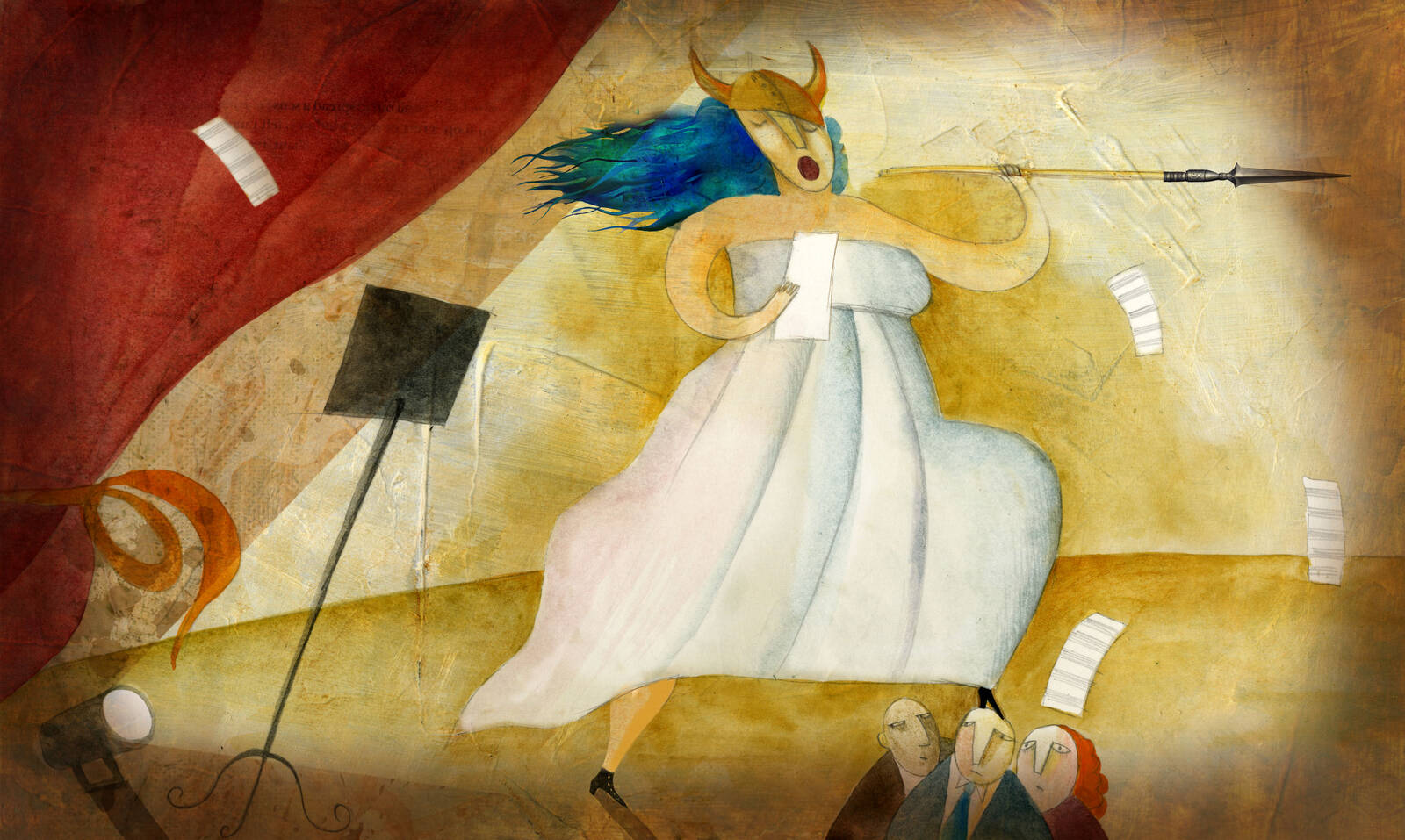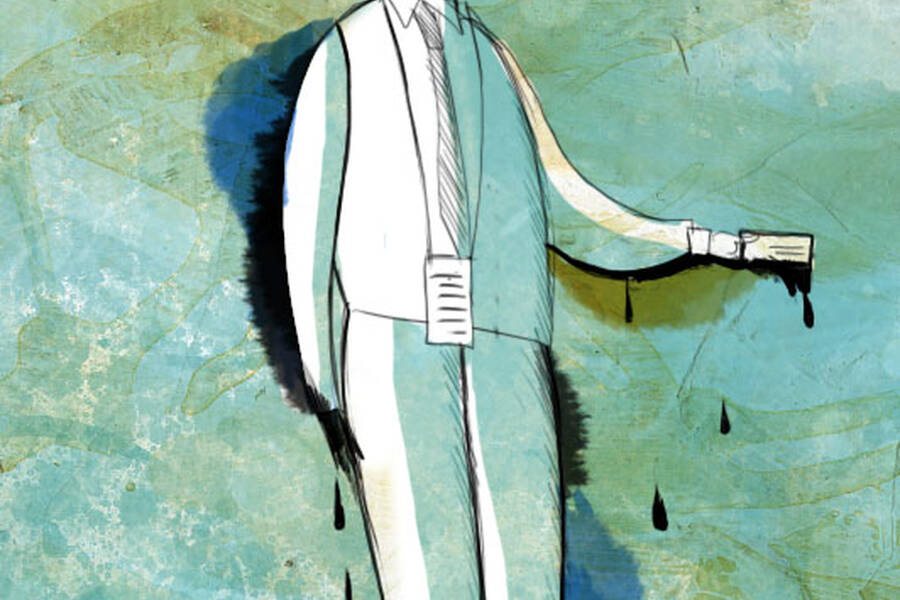Featured Faculty
Professor of Management and Organizations; Management and Organizations Department Chair

Yevgenia Nayberg
When Lynn joined the administrative staff of a major symphony orchestra, she knew the job came with a terrific perk—free tickets to concerts by some of the world’s most talented musicians.
But there was a catch. Lynn soon realized she would be putting up with a lot from these performers. Take, for instance, the vocalist who—if his music stand was wobbly or someone nearby was wearing too much perfume—would throw tantrums so violent that a security guard sat in on rehearsals.
“There were times I would go to a concert, look at the personalities on stage, and think, ‘You’re a jerk. You never turn your paperwork in on time. You got in my face and yelled at me last week,’” says Lynn, who asked to use only her middle name.
Worse, Lynn says, such behavior towards her and every other non-performing employee—stagehands, electricians, ushers—was not only tolerated but accepted because of the performers’ talent.
“If you said, ‘I don’t think this is right,’ or even just ‘Wow, I can’t believe that happened,’ you would hear, ‘Well, that’s who they are, and we have to put up with it,’” she says. “You started believing it yourself, too.”
“You want to encourage a culture of creativity, rather than a special treatment of creative people.” —Maryam Kouchaki
Stories like this may seem to demonstrate the “typical” artist temperament. But according to new research from Maryam Kouchaki of the Kellogg School and Lynne Vincent of Syracuse University’s Whitman School of Management, acting entitled at work is not simply the result of having a creative identity. It takes specific circumstances to elicit such bad behavior: when creativity is seen as a rare trait possessed by only a few special employees, it acts as a sort of license for those employees to behave badly.
And this holds true even if you aren’t creative but you think that you are.
“It doesn’t have to be the case that you actually have creative ability,” Kouchaki says. “What matters at the end of the day is how I perceive myself.”
Kouchaki, an expert in workplace ethics, became interested in studying creativity after encountering research arguing that the trait can lead to morally questionable decisions. Perhaps creativity does not just help someone come up with a new solution to a difficult task, that research suggested. Maybe it also helps someone come up with an inventive justification for, say, padding their hours on that task.
But Kouchaki, an assistant professor of management and organizations, and Vincent thought there might be an alternative explanation.
“What we were thinking was that because of the value typically placed on creativity, creative people might actually feel more entitled, and this heightened sense of entitlement could lead to more dishonest behavior,” Kouchaki says. “If you feel you deserve more than other people, when you are in a tempting situation, that feeling frees you to engage in more self-interested behavior.”
The researchers designed five experiments to examine the relationship between creative identity, psychological entitlement, and dishonest behaviors.
In one experiment, participants completed a word-association test designed to measure their creative potential. Each participant was then randomly given one of three messages. One group was told they did well on a test of creativity and that creativity is rare, and another that they did well on the test of creativity and that creativity is common. A third control group was told they did well, but creativity was not mentioned.
Participants then took part in a game with a few dollars worth of prize money at stake. During the game they had the chance to lie to another participant in order to increase their own portion of the prize.
The results show that when participants were told they were creative but that creativity is common, there was no adverse effect on behavior. It was when they were told that they were uniquely creative that bad behavior ensued.
Participants who had been told that they were creative and that creativity is rare were more than twice as likely to lie to their partners in the game than those in the other two groups. That same group also had a much higher entitlement score on a post-game questionnaire, which asked participants to rate their level of agreement with statements like, “I honestly feel I’m just more deserving than others.”
In other words, Kouchaki says, “it’s about more than your identity or your ability; it’s about the people around you, too. We suggest that when you are surrounded by other creative people, then you don’t necessarily get that sense of entitlement. You are as special as other people, because everyone is creative. But when you are surrounded by noncreative people, your sense of entitlement grows: ‘I deserve preferential treatment.’”
Which means it may not have been creativity itself that caused one musician Lynn worked with to scream with rage if someone brought him a bottle of Fiji water instead of Evian (“not an exaggeration,” she says). Instead, it may have been the fact that in that particular work environment, creativity was considered a trait possessed by only a special few.
As Lynn puts it: “There simply weren’t replacements for these people. There wasn’t an option to fire them or even discipline them for inappropriate behavior, because they were some of the best in the world. There weren’t another 20 brilliant cellists or flautists lining up to take their place.”
Not every instance of creative people behaving badly is so dramatic. More common are stories like those of Jason Rothstein, who managed the creative-production department of a graphic-design company several years ago.
Multimedia was starting to become important to clients, but only one employee had those skills, Rothstein says. He was the only one who had a private office, got to set his own hours, and had specialized equipment reserved just for him.
“This guy would often tell people that he was billing 12 hours on a particular project when he was really working on his own projects,” Rothstein says, “or doing really anything else, because nobody else had experience to evaluate what he was telling them.”
That fiefdom came to a gradual end as multimedia skills became more common, he says. After all, it it’s hard to act hoity-toity about one’s talents when every Tom, Dick, and Harriet down the hall has them too.
That is why Kouchaki recommends that companies refrain from sending the message that creativity is the provenance of a few particular employees. “You want to encourage a culture of creativity,” she says, “rather than a special treatment of creative people.”
So, for example, Lynn’s orchestra could have stressed that even non-performing employees could be creative in the way they approached problem solving.
Of course, creativity does not always lead to questionable behavior.
“Many organizations nowadays are branding themselves around creativity, like Apple,” Kouchaki says. “So are those organizations more likely to be dishonest? That’s too naïve to assume” (no matter how you feel about your iOS 9 update).
Still, Kouchaki’s research offers a clear mandate to companies hoping to attract and retain creative employees—without driving everyone else away in the process.
Future research may determine that this advice applies to other attributes, too, such as wealth, social status, or managerial status. If a firm fosters a culture in which leadership skills or tech savviness are considered the purview of the few, it may also foster entitlement, dishonesty, or both in those who possess them.
And if you are employed at such an organization? There’s always the path Lynn ultimately chose.
After seven years of venting to coworkers, finding solace in after-work drinks, and occasionally crying in her office, she quit.
“I just didn’t want to be part of that anymore,” she says. “Ultimately, my choice was to deal with it or leave, because it wasn’t going to change.”
But there is one bright side, she says: “With the passing of time and being away from them, I’m able to appreciate what they do musically again. I still go to their concerts. I just wouldn’t want to work in that environment.”
Vincent, Lynne, and Maryam Kouchaki. In press. “Creative, Rare, Entitled, and Dishonest: How Commonality of Creativity in One’s Group Decreases an Individual’s Entitlement and Dishonesty. Academy of Management Journal.
